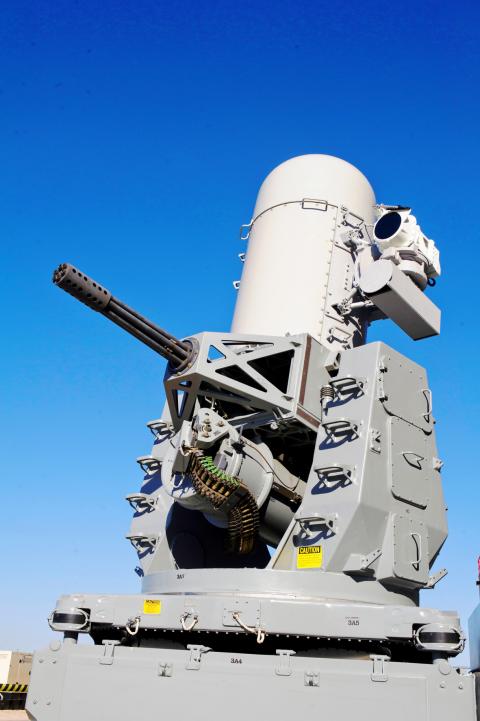Taiwan has accepted part of an arms deal package offered by the US that includes 13 sets of Phalanx close-in weapons systems (CIWS) and other equipment that will cost NT$9 billion (US$286.6 million), Ministry of National Defense sources said yesterday.
The US in December last year extended a letter of offer and acceptance to Taiwan for an arms package costing about US$1.83 billion.
The package included two decommissioned FFG-7 Oliver Hazard Perry-class guided missile frigates, 36 AAV-7 amphibious assault vehicles, 13 MK 15 Phalanx Block 1B ship defense CIWS and upgrade kits, ammunition and support, 250 Block I-92F MANPAD Stinger missiles and other equipment.

Screen grab from the Raytheon Co Web site
Taiwan agreed to buy the frigates in March, the AAV-7 vehicles in May and the Phalanx CIWS last month, the source said.
The CIWS is considered standard equipment on all surface combat ships, the source said, adding that the ministry has deployed the systems in mountainous areas to enhance security at missile bases.
Prior to the signing of the offer last month, the navy had only one MK 15 Block 1B CIWS system on one of its Kidd-class destroyers, the source said.
The MK 15 system is more advanced than the Phalanx systems currently in the Taiwanese arsenal, with the addition of visible light/infrared targeting systems and the ability to switch to manual mode, increasing a surface combat ship’s counterstrike abilities, the source said.
Ministry officials said that delivery of the new systems is expected to be a drawn-out process, with the navy not likely to receive the last batch until June 2024.

CHAOS: Iranians took to the streets playing celebratory music after reports of Khamenei’s death on Saturday, while mourners also gathered in Tehran yesterday Iranian Supreme Leader Ayatollah Ali Khamenei was killed in a major attack on Iran launched by Israel and the US, throwing the future of the Islamic republic into doubt and raising the risk of regional instability. Iranian state television and the state-run IRNA news agency announced the 86-year-old’s death early yesterday. US President Donald Trump said it gave Iranians their “greatest chance” to “take back” their country. The announcements came after a joint US and Israeli aerial bombardment that targeted Iranian military and governmental sites. Trump said the “heavy and pinpoint bombing” would continue through the week or as long

TRUST: The KMT said it respected the US’ timing and considerations, and hoped it would continue to honor its commitments to helping Taiwan bolster its defenses and deterrence US President Donald Trump is delaying a multibillion-dollar arms sale to Taiwan to ensure his visit to Beijing is successful, a New York Times report said. The weapons sales package has stalled in the US Department of State, the report said, citing US officials it did not identify. The White House has told agencies not to push forward ahead of Trump’s meeting with Chinese President Xi Jinping (習近平), it said. The two last month held a phone call to discuss trade and geopolitical flashpoints ahead of the summit. Xi raised the Taiwan issue and urged the US to handle arms sales to

State-run CPC Corp, Taiwan (CPC, 台灣中油) yesterday said that it had confirmed on Saturday night with its liquefied natural gas (LNG) and crude oil suppliers that shipments are proceeding as scheduled and that domestic supplies remain unaffected. The CPC yesterday announced the gasoline and diesel prices will rise by NT$0.2 and NT$0.4 per liter, respectively, starting Monday, citing Middle East tensions and blizzards in the eastern United States. CPC also iterated it has been reducing the proportion of crude oil imports from the Middle East and diversifying its supply sources in the past few years in response to geopolitical risks, expanding

Pro-democracy media tycoon Jimmy Lai’s (黎智英) fraud conviction and prison sentence were yesterday overturned by a Hong Kong court, in a surprise legal decision that comes soon after Lai was jailed for 20 years on a separate national security charge. Judges Jeremy Poon (潘兆初), Anthea Pang (彭寶琴) and Derek Pang (彭偉昌) said in the judgement that they allowed the appeal from Lai, and another defendant in the case, to proceed, as a lower court judge had “erred.” “The Court of Appeal gave them leave to appeal against their conviction, allowed their appeals, quashed the convictions and set aside the sentences,” the judges